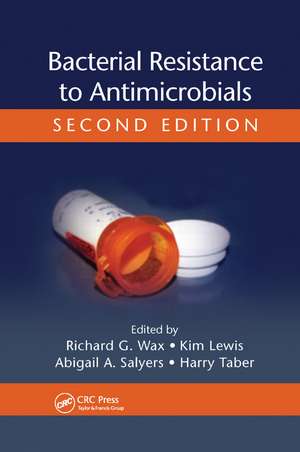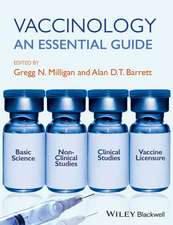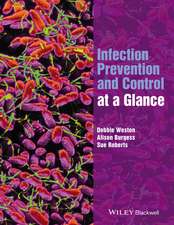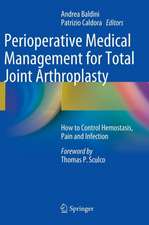Bacterial Resistance to Antimicrobials
Editat de Richard G. Wax, Kim Lewis, Abigail A. Salyers, Harry Taberen Limba Engleză Paperback – 19 sep 2019
Extensively revised, with contributions from international leaders in their fields, Bacterial Resistance to Antimicrobials, Second Edition blends scientific and practical approaches to the social, economic, and medical issues related to this growing problem. The book begins with a history of antimicrobial agents and bacterial resistance, and outlines the forces that contributed to the abuse of antibiotics and precipitated the current crisis. It goes on to describe what is known about the ecology of antibiotic resistant bacteria and reveals the inadequacies in our understanding. Emphasizing public health aspects, the editors stress that significant progress will be made only by addressing the problem only as a public, worldwide, problem.
Chapters on resistance mechanisms describe the latest findings on what makes different groups of bacteria susceptible or resistant to antibiotics. They reveal the staggering diversity of bacteria and the need for a foundational understanding that will stimulate development of antibiotics capable of avoiding resistance mechanisms. Examining the success and limitations of complementary approaches, such as combining ß-lactam antibiotics with ß-lactamase inhibitors, the book brings together information on resistance mechanisms in different groups of bacteria to help future efforts to more effectively develop and deploy antimicrobial therapies.
Toate formatele și edițiile
| Toate formatele și edițiile | Preț | Express |
|---|---|---|
| Paperback (1) | 489.26 lei 6-8 săpt. | |
| CRC Press – 19 sep 2019 | 489.26 lei 6-8 săpt. | |
| Hardback (1) | 1800.94 lei 6-8 săpt. | |
| CRC Press – 5 dec 2007 | 1800.94 lei 6-8 săpt. |
Preț: 489.26 lei
Preț vechi: 575.60 lei
-15% Nou
Puncte Express: 734
Preț estimativ în valută:
93.64€ • 101.08$ • 78.52£
93.64€ • 101.08$ • 78.52£
Carte tipărită la comandă
Livrare economică 19 aprilie-03 mai
Preluare comenzi: 021 569.72.76
Specificații
ISBN-13: 9780367388072
ISBN-10: 0367388073
Pagini: 444
Dimensiuni: 156 x 234 x 30 mm
Greutate: 0.45 kg
Ediția:Nouă
Editura: CRC Press
Colecția CRC Press
ISBN-10: 0367388073
Pagini: 444
Dimensiuni: 156 x 234 x 30 mm
Greutate: 0.45 kg
Ediția:Nouă
Editura: CRC Press
Colecția CRC Press
Public țintă
Professional ReferenceCuprins
Microbial Drug Resistance: A Historical Perspective. Ecology of Antibiotic Resistance Genes. Global Response Systems that Confer Resistance. Multidrug Efflux Pumps: Structure, Efflux, and Inhibition. Mechanisms of Aminoglycoside Antibiotic Resistance. Resistance to ß-Lactam Antibiotics Mediated by ß-Lactamases. Target Modification as a Mechanism of Antimicrobial Resistance. Antibiotic Permeability. Genetic Methods for Detecting Bacterial Resistance Genes. The Evolution and Epidemiology of Antibiotic Resistant Pneumococci. Antimicrobial Resistance in the Enterococcus. Methicillin Resistance in Staphylococcus aureus. Mechanism of Drug Resistance in Mycobacterium tuberculosis. Antibiotic Resistance in Enterobacteria. Resistance as a Worldwide Problem. Public Health Responses to Antimicrobial Resistance in Outpatient and Inpatient Settings. Antibacterial Drug Discovery in the 21st Century.
Notă biografică
Richard G. Wax, Kim Lewis, Abigail A. Salyers, Harry Taber
Descriere
Blending scientific and practical approaches, this second edition examines the social, economic, and medical issues related to the growing problem of bacterial resistance. It outlines the forces that contributed to the abuse of antibiotics and precipitated the current crisis. The core chapters describe the latest findings bacterial ecology, the biomechanics of resistance and susceptibility, and the latest avenues to develop new antibiotics that are themselves resistant to resistance mechanisms. Examining the success and limitations of complimentary approaches, such as combining a b-lactam antibiotic with a b-lactamase inhibitor, the book pulls together all of the information on resistance mechanisms in different groups of bacteria to help future efforts develop effective combinations.







